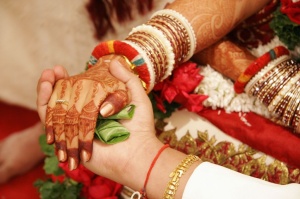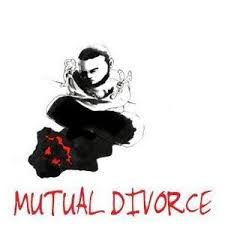Instructions

Hindu marriage joins two individuals for life, so that they can pursue dharma (duty), artha (possessions), kama (physical desires), and moksha (ultimate spiritual release) together. It is a union of two individuals as husband and wife, and is recognized by law.
The marriage tied their nuptial knot to bring about the union of souls. The marriage creates a new relationship of love, affection, care and concern between the husband and wife. According to Hindu Vedic philosophy, it is sanskar- sacrament, one of the sixteen important sacraments essential to be taken during one’s lifetime. As a result of marriage there may be physical union between the parties of the marriage for procreation of lineal progeny and for ensuring spiritual salvation and performance of religious rites but what is essentially contemplated is the union of two souls. Marriage is considered to be a junction of three important duties i.e. social, religious and spiritual
Divorce

According to the Indian divorce laws there are mainly two ways to obtain you divorce, the mutual divorce and the contested divorce. In case of a mutual divorce, you can have a talk with your estranged spouse to come to a settlement and get a “no-fault divorce”. If you are seeking a contested divorce, you can file your divorce on the grounds that are specified under the particular Indian marriage act that you are entitled to. There are separate divorce laws for Hindus, Christians, Parsis and Muslims. Sikhs, Jains and Buddhists are governed by the Hindu Marriage Act, 1955 for filing for divorce in India. Laws are even laid down for Inter-cast marriages under the Special Marriage Act, 1956.
Types of Divorce
Mutual Consent – Both the spouses are in agreement that divorce cannot be avoided and they both opt for a “no fault” Divorce.
Section 28. Divorce by mutual consent Under Special Marriage Act

(1) Subject to the provisions of this Act and to the rules made thereunder, a petition for divorce may be presented to the District Court by both the parties together on the ground that they have been living separately for a period of one year or more, that they have not been able to live together and that they have mutually agreed that the marriage should be dissolved.
(2) On the motion of both the parties made not earlier than six months after the date of the presentation of the petition referred to in sub-section (1) and not later than eighteen months after the said date, if the petition is not withdrawn in the meantime, the District Court shall, on being satisfied, after hearing the parties and after making such inquiry as it thinks fit, that a marriage has been solemnized under this Act and that the avertments in the petition are true, pass a decree declaring the marriage to be dissolved with effect from the date of the decree
Section 13-B of Hindu Marriage Act,1955,
Divorce by mutual Consent.
(1) Subject to the provisions of this Act a petition for dissolution of marriage by a decree of divorce may be presented to the district court by both the parties to a marriage together, whether such marriage was solemnized before or after the commencement of the Marriage Laws Amendment Act, 1976 , (68 of 1976 .) on the ground that they have been living separately for a period of one year or more, that they have not been able to live together and that thy have mutually agreed that the marriage should be dissolved.
(2) On the motion of both the parties made not earlier than six months after the date of the presentation of the petition referred to in sub- section (1) and not later than eighteen months after the said date, if the petition is not withdrawn in the meantime, the court shall, on being satisfied, after hearing the parties and after making such inquiry as it thinks fit, that a marriage has been solemnized and that the averments in the petition are true, pass a decree of divorce declaring the marriage to be dissolved with effect from the date of the decree.
Contested Divorce – The spouse seeking divorce can file under the appropirate faith based law under which they got married or in case of civil marriage under the appropirate law under which they married or their marriage was registered.
Governing Laws
Hindus – The Hindu Marriage Act, 1955
Christians – The Divorce Act,1869, The Indian Christian Marriage Act,1872
Parsis – The Parsi Marriage and Divorce Act,1936
Muslims – Shariat Law, The Dissolution of Muslim Marriage Act,1939
Inter-cast/Secular – Special Marriage Act, 1954, The Foreign Marriage Act,1969
Major Grounds for Divorce
Adultery
Deserting the spouse for two or more years
Physical or mental cruelty
Conversion to another religion in case of religious marriage
Incurable disease such as leprosy, venereal disease in a communicable form
Insanity, unsound mind or mental disorder
Renounced the world by entering any religious order in case of religious marriage
Unheard of as being living for a period of seven years or more
Section 19 in The Hindu Marriage Act, 1955 (Jurisdiction to File Divorce Petition in India).
Court to which petition shall be presented. Every petition under this Act shall be presented to the district court within the local limits of whose ordinary original civil jurisdiction
(i) the marriage was solemnised, or
(ii) the respondent, at the time of the presentation of the petition, resides, or
(iii) the parties to the marriage last resided together, or
41 [(iiia) in case the wife is the petitioner, where she is residing on the date of presentation of the petition, or]
(iv) the petitioner is residing at the time of the presentation of the petition, in a case where the respondent is, at that time, residing outside the territories to which this Act extends, or has not been heard of as being alive for a period of seven years or more by those persons who would naturally have heard of him if he were alive.]
Jurisdiction of the Court If a marriage is solemnised at a place within the municipal limit and the party reside there only, the family Court would have exclusive jurisdiction to deal with case. The case cannot be transferred to district court on a ground that the husband resides outside the limits of municipal corporation; Arjun Singhal v. Pushpa Karwel, AIR 2003 MP 189.
